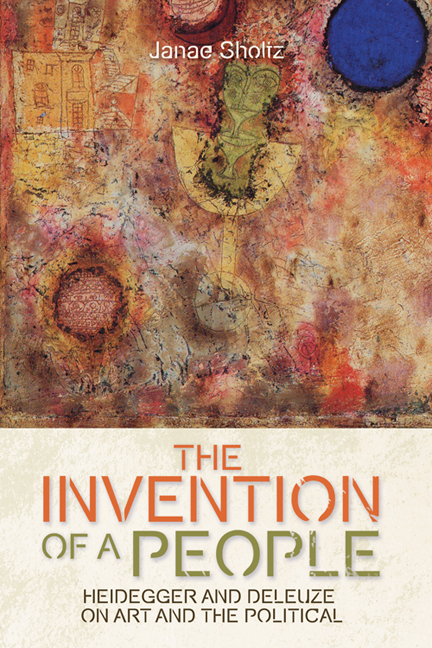Book contents
- Frontmatter
- Contents
- Acknowledgments
- Abbreviations
- Introduction: The People Are Missing
- PART I DIVERGENCE, THE POINT OF NIETZSCHE
- PART II (UN)THINKING, WHAT MUST BE THOUGHT
- Introduction to Part II
- 3 Heidegger on Art and Ontology
- 4 Deleuze on Art and Ontology
- PART III (UN)EARTHING A PEOPLE-TO-COME
- CONCLUDING EVENT
- Index
3 - Heidegger on Art and Ontology
from PART II - (UN)THINKING, WHAT MUST BE THOUGHT
Published online by Cambridge University Press: 05 August 2016
- Frontmatter
- Contents
- Acknowledgments
- Abbreviations
- Introduction: The People Are Missing
- PART I DIVERGENCE, THE POINT OF NIETZSCHE
- PART II (UN)THINKING, WHAT MUST BE THOUGHT
- Introduction to Part II
- 3 Heidegger on Art and Ontology
- 4 Deleuze on Art and Ontology
- PART III (UN)EARTHING A PEOPLE-TO-COME
- CONCLUDING EVENT
- Index
Summary
To repeat and retrieve (wieder-holen) the inception of our historicalspiritual Dasein, in order to transform it into the other inception … the inception is repeated when … the inception is begun again more originally, and with all the strangeness, darkness, insecurity that a genuine inception brings. (GA40, 42/41)
Through his historical excavation of being (thinking-beyng-historically), Heidegger determines that metaphysics is in its final stage, an age of nihilism ushered in by Nietzsche as the final entanglement in metaphysics. Human beings have become disconnected from the origins of thought and the richness of being. Overcoming metaphysics necessitates the need for another beginning, nothing short of a radical leap. What might constitute such a leap into another beginning is really the issue. The leap is a founding and the broadest leap is that of thinking (GA65, section 120). In Contributions, Heidegger devotes an entire fugue (chapter) to this issue, beginning with some general characteristics of the leap in section 115. The leap requires abandoning the familiar, which is to say, an acknowledgement of the utmost abandonment of being, the attunement of deep awe, and releasement into belongingness brought about through the awareness of one's condition of complete thrownness, which would amount to a return to our essence as deinon.
But we must take a step away from the specific constitution of the leap in order to see Heidegger's trajectory more clearly. As Heidegger begins to think the possibility of another beginning, there are three significant, intertwining factors: (1) the necessity of returning to the Greek origins of thought, in order to retrieve something of the original sense of the historical essence of Dasein; (2) his devotion to Hölderlin, the German poet who both experienced the oblivion of being (the flight of the gods) and founded the possibility of another beginning both in terms of the German/Greek relation and in light of the hinting toward the gods, which initiates the possibility for new decisions about the god/human relation; (3) his commitment to art as providing the path through to this other beginning.
- Type
- Chapter
- Information
- The Invention of a PeopleHeidegger and Deleuze on Art and the Political, pp. 83 - 124Publisher: Edinburgh University PressPrint publication year: 2015



